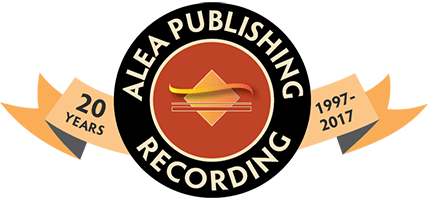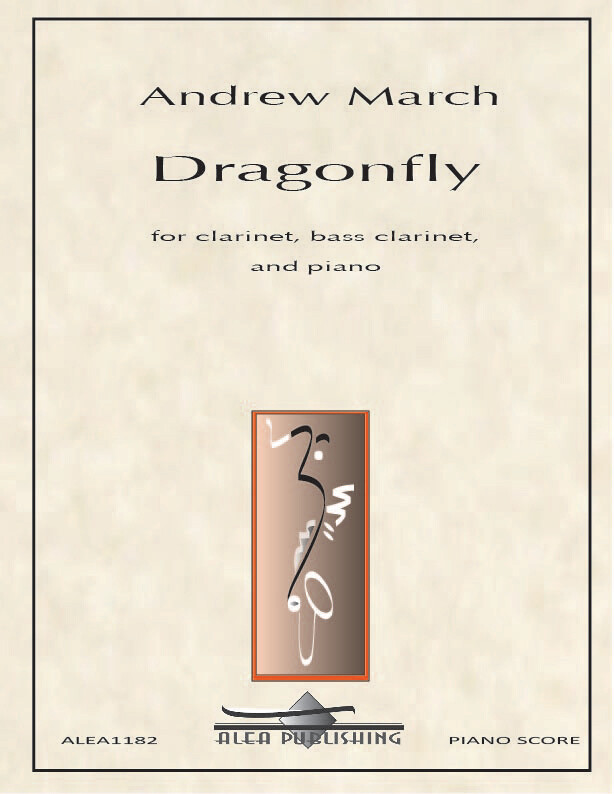

Welcome!
This site is home to Alea Publishing & Recording, specializing in music for the bass clarinet.
We offer a growing catalog of creative, artistic transcriptions and new works for bass clarinet solo & ensemble.
March: Dragonfly
About the Work
Program note courtesy of the composer:
This piece was originally written for piano and flute, circa 1990. It has since been adapted a number of times for differing instrumentation. It was recast in 2001 for alto flute and harp, and in 2016, it was rewritten once more for trio of flute, viola and harp. Following the publication of the version for trio, it became clear that with some careful consideration, Dragonfly could be reworked for clarinet, bass clarinet and piano. By way of a fundamental precept, each instrument was to retain a vital and fully developed role, despite the change in instrumentation. Each part needed to be independent, substantial, and meaningful enough to engage the players fully.
The piece opens with a mysterious, ponderous passage intended to set the scene of the enigmatic world of Odonata. The piano introduces the frenetic movement characteristic of a restless dragonfly. The trio's material is not intended to onomatopoeically imitate the insect's private language but instead, figurative material is employed to suggest a certain behavioural pattern. Although the instruments tend to work together, the fluttery flight and erratic movement are idiomatic to the clarinet, as it rarely settles, and when it does; not for long.
Gliding on the updraft of a warm summer's evening, the use of same-note 'timbral trills' and flatterzungeenables the aerial acrobat to hover and sputter, then dart off in a random direction. Through a soft rippling action, the piano - marked una corda throughout - provides an image of the watery environment necessary for the flitting form of the dragonfly as it grazes the surface of the water. The harmonic direction, led by the piano, often turns a sudden corner. Textural support, provided by the bass clarinet, offers tension, grit and the buzz of vibration, and through carefully chosen tremolos, contrast and colouration is added.
An accented, subito cut-off marks a clear change of mood as the central section brings a turbulent, more predatory episode. The music exploits the unfamiliar truth that the creatures are, in fact, voracious eaters rather than just delicate, colourful aviators. The bass clarinet offers a greater degree of 'bite', befitting the toothed-jaw carnivores. The intense clarinet trills dismantle the prey in mid-air, whilst the discarded remains fall to the ground with the violent contrary-motion flourishes from both hands of the piano.
The clarinet and bass clarinet's use of delicate ornamentation is intentionally different each time, suggestive of the dragonfly's ability to control its two pairs of wings. This considerably varies their flying style as they seamlessly pass the melodic line from one to another. As the music calms, a brief high-soaring passage offers an opportunity for the clarinet to discharge the excess energy. The piece then returns to the more familiar, flowing material and after the pace slowly decreases, the spacious arpeggios in the piano herald the close of the piece as the clarinet and bass clarinet finally settle.
Extended-range instrument NOT required. Score: 25 pages, spiral bind; Parts: 7 pages each; published loose-leaf to facilitate page turns.
About the Composer
British composer Andrew March was born in 1973. In 1992, he attended the Royal College of Music, London, to study composition. Shortly after graduating, Andrew won the Royal Philarmonic Society Composition Prize 1996 for his symphonic poem, Easdale. His orchestral piece Marine - à travers les arbres (1997) won first place in the inaugural Masterprize International Composing Competition, and was recorded by the BBC for the European Broadcasting Union and by the London Symphony Orchestra in Abbey Road Studios for EMI Classics Debut Series. A cover-mount CD was included on the BBC Music Magazine in 1998. Marine - à travers les arbres has been played by orchestras such as the BBC Philharmonic and has received a total of 13 international live performances including the Moscow Radio Symphony Orchestra and the European Union Youth Orchestra under Vladimir Ashkenazy which was televised for the BBC Proms in 1998.
In 2001, Nymphéas for Two Pianos was written for pianist brothers duo Peter & Patrik Jablonski, who gave the World premiere in the Royal Palace, Stockholm, in the Autumn of 2002, and then followed with a tour that programmed the piece in and around Scandinavia. In July 2005, A Stirring in the Heavenlies(2000) was successfully recorded, in full, by the Kiev Philharmonic under composer/conductor Robert Ian Winstin for the landmark 12-CD series Masterworks of the New Era.
In 2009, Andrew composed an elegy for strings, Sanguis Venenatus which was recorded in the Czech Republic and released towards the end of 2012. The elegy has subsequently been broadcast on BBC Radio 3 and internationally, with repeat airings during drive-time programmes on stations such as Sweden's P2 Klassiskt, Estonia's Klassikaraadio, and South Africa's Classic FM.
In October 2013, Three Pieces for Solo Cello were premiered in New York by Romanian-born cellist Ovidiu Marinscu at the Weill Recital Hall, Carnegie Hall. The three pieces were also recorded. Also in 2013, Paraclete Press published De Profundis. In 2015, Colla Voce Music published two pieces, Marian Antiphon No. 3 and How Long, O Lord?. In January 2016, Amoration for Piano and Strings was recorded at the MRTV studios in Skopje with the Macedonian Radio Symphonic Orchestra.
About Us

Kim Davenport
President
Duo Alea, the father-daughter duo of Michael and Kimberly Davenport, began performing music for bass clarinet and piano in 1996. As performers searching for new repertoire and teachers working with students eager to develop as performers, it quickly became clear that there was a need for more repertoire featuring the bass clarinet. Filling this need became the mission of Alea Publishing & Recording.
Since our first publication in 1997, the Alea catalog has now grown to include over 300 titles. We pride ourselves on the accuracy and quality of our sheet music, as well as our ability to ship directly to customers around the world.
We are proud of the diversity of our catalog in terms of the inclusion of works by composers and arrangers from around the world. We are interested in continuing to expand this diversity, representing musical ideas from around the world.
Following Michael's passing in 2019, Kim has taken over solo management of Alea Publishing. In 2020, Alea established the Dolphy Prize, an annual composition award for new works for bass clarinet by black composers.
Would you like to be informed about additions to our catalog and other news? Join our e-mail list!
